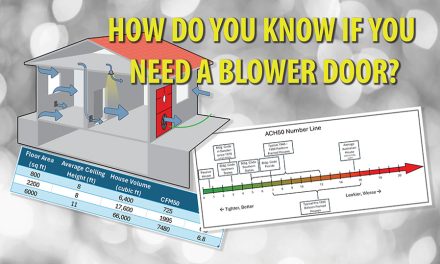
Dominick Guarino
Training is an ongoing process. It is never done. The whole point of training is progression. As you learn new things, your mind becomes ready to accept the next level, and the next, and so on.
You will have a much better chance of success with a plan, goals, and milestones to assess progress, make course corrections, and maintain a strong, vibrant training program.
By working with literally thousands of contractors since the early 1990s, one important lesson is clear: unless your company can make much more money testing performance, and delivering system improvements, you likely won’t stick with it long-term.
 To help ensure this happens, the NCI education process infuses our technical training with customer interaction, sales, marketing and business opportunity aspects of the Performance-Based approach. In this article we’ll examine five important keys to building a training program focused on High Performance HVAC:
To help ensure this happens, the NCI education process infuses our technical training with customer interaction, sales, marketing and business opportunity aspects of the Performance-Based approach. In this article we’ll examine five important keys to building a training program focused on High Performance HVAC:
- Determine Your Training Needs
- Short and Long-Term Training Goals
- Knowledge, Skills, and Abilities
- Training by Role
- Formal Versus Internal Training
 Determine Your Training Needs
Determine Your Training Needs
At NCI we have trained tens of thousands of professionals in thousands of HVAC companies from around the world for more than two decades. We’ve benefited from this experience by seeing what works and what doesn’t in different types of companies at different stages in their progression towards High Performance.
|
While there are similarities between companies, we find when it comes to training needs, each organization can be as unique as a fingerprint. Each company is greatly influenced by the entrepreneur who built it, coupled with local market conditions, geography, and other factors.
These other factors include business mix like residential/commercial, and service/installation. They also include specialty work ranging from geothermal, to home sealing and insulating, to solar and other technologies.
Because of this diversity, training needs vary significantly from one company to the next. As you evaluate your needs, you need to first ask yourself a very important question: ‘How quickly do I want to grow into a Performance-Based Contractor??
Are you on a slow, steady path and prefer to take several years, or do you want to fast track your company, and build a Performance-Based culture in a year or less?
The answer will help you make decisions on the resources you’re willing to invest in training ‘ especially the initial formal training. Your biggest investment is not the cost of the training itself. It really is your employees’ time away from work, lost opportunities, and lost revenue. As with any training, these costs are real, and must be worth the investment.
If you’re just getting started and want to take it slow and steady, begin by sending your field people to basic performance training classes like NCI’s Duct System Optimization class, where they will learn about measuring static pressures, airflow, and how they are connected.
In this type of class they will also learn to translate test results into lay language. This is to teach customers about the condition of their comfort system, and how to improve it.
If you want a faster track, you may want to send your people to a rapid series of training: starting with Duct System Optimization, then in a month or so jumping to Combustion Efficiency and CO Safety. Soon after, they can move up to Residential System Performance.
You’ll also want your key people, who will balance systems after new installations or duct renovations, to take an Air Balancing Certification class.


 Catch Up On All the
Catch Up On All the









Recent Comments